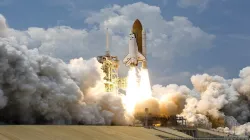India to be a part of SERA and Blue Origin's citizen astronaut programme
The US-based Space Exploration and Research Agency (SERA) and Blue Origin have unveiled an exciting collaboration with India as a partner nation in their human spaceflight program. This initiative aims to make space travel more accessible.

US-based Space Exploration and Research Agency (SERA) and Blue Origin have announced India as a partner nation in their human spaceflight programme, in a bid to democratise space. SERA will reportedly offer citizens from India a seat on Blue Origin’s future mission of reusable rocket New Shepard on an 11-minute journey past the Karman line (100 km), the internationally-recognised boundary of space.
Indian citizens will be part of the 6 seats that together SERA and Blue Origin aim to offer to people from countries that have sent few or no citizen astronauts to space.
The astronauts will be experiencing several minutes of weightlessness before making a controlled descent back to the landing pad.
Joshua Skurla, Co-Founder, of SERA said, “We’re excited to have India as part of our human spaceflight programme."
While lauding India for “becoming the first country to reach the Moon’s South Pole”, he said the company aims “to make space accessible for everyone and is happy to offer this unique opportunity to an Indian citizen who wants to experience the wonders of space travel.”
Any Indian citizen could easily register for the programme by paying a fee of about USD 2.50 to cover the costs of verification checks that ensure safe and fair voting.
The final candidates which will be voted for by the public will be based on their story which they can promote via their mission profile pages, social media, and other resources, for an opportunity to fly to space onboard the New Shepard mission.
The potential astronauts will be required to meet Blue Origin's physical requirements. The final crew of six will arrive three days before the flight for training at Blue Origin’s launch site in West Texas.
ALSO READ: Technical glitch on Starliner traps NASA astronauts Sunita Williams and Butch Wilmore in space
It was reported on June 27 (2024 that NASA astronauts Sunita Williams and Butch Wilmore have been stuck at the International Space Station (ISS) as the engineers are continuing to fix the Boeing Starliner spacecraft that will take them back to Earth. It was originally decided that the astronauts would spend 8 days on the orbiting space laboratory. Both the astronauts reached the ISS on June 6, but the stay was extended due to technical concerns.
Inputs from IANS